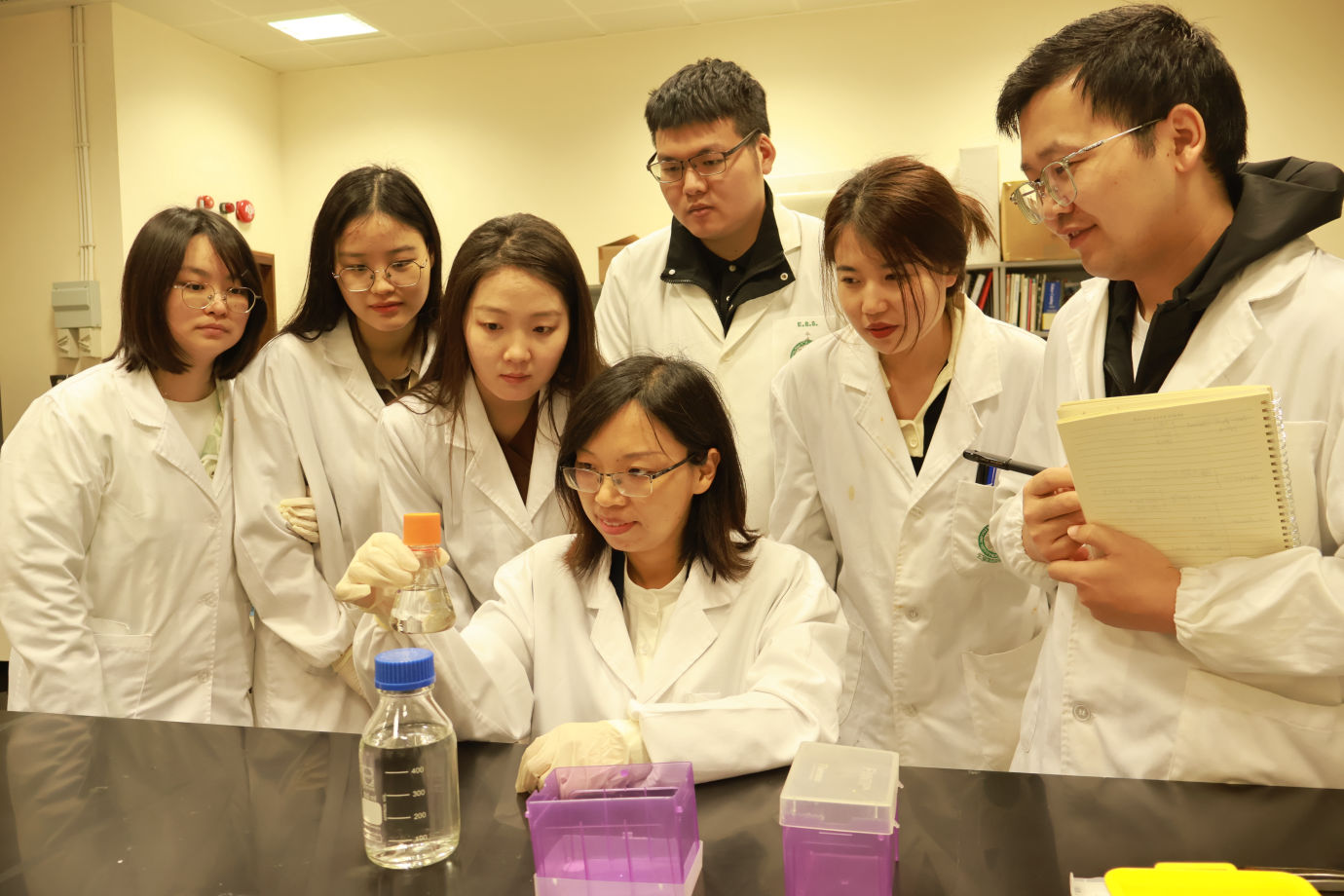

Liu Huanxiang, Professor of Centre for Artificial Intelligence Driven Drug Discovery in the Faculty of Applied Sciences, has dedicated over 20 years to pharmaceutical research, specialising in computer-aided drug design and molecular simulations. Her significant contributions have advanced understanding of neurodegenerative diseases, mechanisms of bacterial and viral resistance, and drug design strategies. Highly esteemed in her field, Professor Liu has published over 230 SCI papers, with her research cited more than 5,000 times. She ranked among the top 2% of global scientists in Stanford University’s rankings from 2019 to 2021. In this exclusive interview, Professor Liu shares the significance and joy of her work, offering insights into her impactful research journey.
Pioneering the Path to Drug Discovery
Professor Liu Huanxiang’s career in pharmaceutical research began during her doctoral studies, when she discovered the potential of cheminformatics, a field blending chemistry and computer science. Trained as a chemist, she was an early advocate for using computer technology in chemical research, recognising its relevance to drug design well before the artificial intelligence (AI) boom. “I realised early on that cheminformatics could significantly impact practical drug design,” she noted, highlighting her vision for applying technology to major health challenges. “Information technology can help us solve many health problems that affect everyone’s life.”
Since 2008, when she joined an independent research group at Lanzhou University, Professor Liu has focused on drug design and discovery. Her work has covered a broad range, from cheminformatics to assessing the risks of endocrine disruptors during her postdoctoral work in Italy and studying protein structures and functions in Hong Kong and Beijing. Now at MPU, with its strong focus on AI, she leads pioneering efforts in AI-driven drug discovery targeting specific disease mechanisms considering immense potential for AI in enhancing disease diagnosis and advancing personalised medicine. “AI is integral to every phase of drug development, from discovering targets to conducting clinical trials,” she states.

Maximising Macao’s Potential to Aid Underprivileged Regions
Located at the mouth of the Pearl River, Macao is strategically positioned as a key player in the development of the Greater Bay Area’s health industry. Professor Liu points out, “Macao is relatively well-endowed with scientific research resources in basic research, providing solid support for academic exploration and innovation, and creating conditions for future technological achievements and their applications.”
Macao’s unique status as a cultural and economic bridge between China and Portuguese-speaking countries enhances its role in international academic collaboration. “The national focus and strategic investments in the Greater Bay Area have accelerated the growth of new medical enterprises here,” she notes, emphasising Macao’s role in fostering multicultural exchanges and knowledge sharing.
She discusses the collaborative efforts at the Centre for Artificial Intelligence Driven Drug Discovery (AIDD). The centre has partnered with Sun Yat-sen University to study tropical diseases common in economically challenged regions along the “Belt and Road” Initiative. “These diseases, often ignored due to their low profitability, urgently need attention to aid vulnerable populations,” she explains. Additionally, AIDD secured research funding in its collaboration with Hunan University last year to enhance AI-driven drug design techniques. By forming strategic partnerships, AIDD aims to pioneer new treatment approaches, leveraging Macao’s capabilities in pharmaceutical innovation.

Enhancing the Interpretability of AI Technology
Integrating AI into drug discovery presents challenges, as outlined by Professor Liu. A major issue is the need for more quality data. “The collection of drug metabolism data varies across laboratories due to different standards, leading to biases in data integration. More quality data would enhance model accuracy,” she explains.
Another challenge is the intelligent generation of molecules. After generating a molecule, its activities, including affinity and regulatory interactions with targets, and drug potential, considering metabolism, toxicity, absorption, and distribution, must be evaluated. Achieving multi-objective optimisation is highly complex.
AI models in drug discovery often operate as “black boxes,” where the internal workings are opaque, making it difficult to understand their functions beyond observing the outputs from given inputs. “In chemistry and pharmacy, professionals depend on experimental evidence and need to understand the computational processes and rationale behind model predictions. Making AI models transparent and reliable is a key focus for AI specialists,” she notes.
Addressing these, she is devoted to developing quality datasets, new algorithms like active learning and data augmentation, and interpretable AI technologies. “The accuracy of a model relies heavily on well-organised, high-quality data, which is our primary focus,” she states. Through these initiatives, she aims to build a comprehensive AI-driven drug discovery platform at MPU to accelerate the creation of effective new treatments.
Multiple Strategies for Exploring New Interdisciplinary Fields
Professor Liu highlights that both artificial intelligence and drug discovery require deep specialisation. To foster effective interdisciplinary collaboration at AIDD, several strategies are in place. The centre emphasises interdisciplinary education to cultivate experts skilled in both fields. It employs joint supervision to bridge knowledge gaps, allowing students to draw on insights from both disciplines. “Doctoral students at MPU have strong research skills and a solid foundation in their areas. Under mentors’ guidance, they effectively learn both disciplines,” she explains. Additionally, the centre pursues collaborative research with other universities and institutions, accessing facilities and resources outside MPU, such as drug development labs. These partnerships enhance the centre’s capabilities by combining strengths across disciplines and sectors.
Synergy Between Information Technology and Pharmacy
Throughout her career, Professor Liu has extensively studied neurodegenerative diseases like Alzheimer’s and Parkinson’s. Reflecting on her career highlights, she notes, “I would not call myself proud, but I have achieved some notable results. We have published numerous papers and received international funding.” Her research has gained international recognition and has even been cited by recent Nobel Prize laureates in the field.
At MPU, Professor Liu leverages her research foundation to advance studies in drug discovery enhanced by artificial intelligence. Professor Liu combines her research expertise with the University’s artificial intelligence capabilities to enhance drug discovery. She believes that the synergy between artificial intelligence technology and her pharmaceutical research can lead to significant advances. Since founding AIDD, the University has supported the initiative with advanced computing equipment and essential software. “MPU’s strength in artificial intelligence enhances our team’s research capabilities significantly,” she remarks. Through her work at the centre, she aims to improve drug development processes in Macao and beyond.
Aspirations for Drug Discovery
Professor Liu is optimistic about the future of artificial intelligence in pharmaceutical research, expecting major advances in drug molecule synthesis and personalised medicine, along with improvements in model interpretability. She believes that as artificial intelligence methods evolve, the acceptance of information technology applications in medicinal chemistry will grow.
Professionally, Professor Liu aspires to enhance public health by developing proprietary drugs, which drives her passion for research. Her current goal is to work with the researchers at the centre to establish an AI-driven drug design platform, aiming to launch projects that address societal needs, foster socially impactful research, and develop top-tier talent to benefit both industry and academia. “I believe we can use MPU’s resources to advance pharmaceutical research and make meaningful contributions,” she states enthusiastically.
She seeks to create significant, incremental innovations by merging MPU’s artificial intelligence strengths with her team’s pharmaceutical expertise. Upholding the University's educational goals, she focuses on the University’s concept of talent development and knowledge advancement through various collaborative projects, pushing interdisciplinary collaboration and artificial intelligence applications to new levels.

Professor Liu Huanxiang and the team foster impactful research
Text / Eddie Long, Chelsea Zhang, Wei Xiao Lu
(Members from the Creative Planning Talent Development Programme)